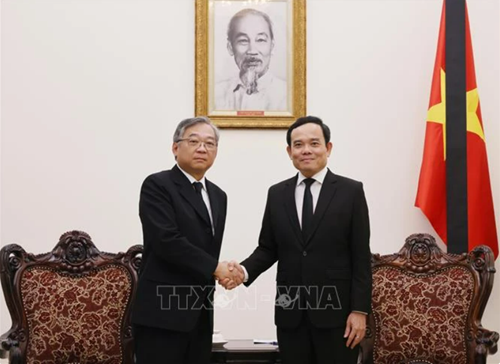Deputy PM Gan Kim Yong extended the deepest condolences from the Government and people of Singapore over the death of the Vietnamese Party leader, a great leader who laid a firm foundation for the Singapore-Vietnam relationship. He highlighted that during the Party chief’s visit to Singapore in 2012, General Secretary Nguyen Phu Trong and Singaporean leaders established the foundation for the two countries to set up the strategic partnership one year later.
    |
 |
|
Deputy Prime Minister Tran Luu Quang (right) and Singaporean counterpart Gan Kim Yong at their meeting in Hanoi on July 25 |
The two sides continue to strengthen the bilateral strategic partnership in following years, he said, citing as examples the building of 18 Vietnam-Singapore Industrial Parks (VSIPs) in Vietnam, which have contributed to the country’s development and progress, and the signing of an MoU on the establishment of a Green-Digital Economic Partnership. Most recently, the two sides also inked an agreement on renewable energy, under which Vietnam will supply clean energy for Singapore.
Deputy PM Quang thanked Deputy PM Gan and the Singaporean delegation for attending the funeral of General Secretary Trong, sharing the grief of Vietnam over the great loss. He also asked Gan to convey his gratitude to the President, Prime Minister and other leaders of Singapore for their messages of condolences, stressing that the sympathies of Singaporean leaders are clear evidence of the close friendship and sharing between the two countries.
To build on the results of bilateral cooperation, Quang proposed that the two countries effectively maintain contact and exchanges at all levels, utilize bilateral cooperative mechanisms, particularly the ministerial level mechanism on economic connectivity.
He wished that the two sides would maximize the green-digital economic partnership and the agreement on economic connectivity, suggesting that they develop the VSIP network in a smart, green and sustainable direction and enhance collaboration in new fields like digital transformation, circular economy, innovation, clean energy while promoting ties in education-training and high quality human resources.
The two sides agreed that the two countries should set goals and design plans to elevate bilateral relations to a new height, promote green-digital economic cooperation through specific projects, encourage the two education ministries to strengthen their collaboration in education-training to prepare the workforce for rapid changes in science-technology, and continue to coordinate and support each other at multilateral forums.
Source: VNA